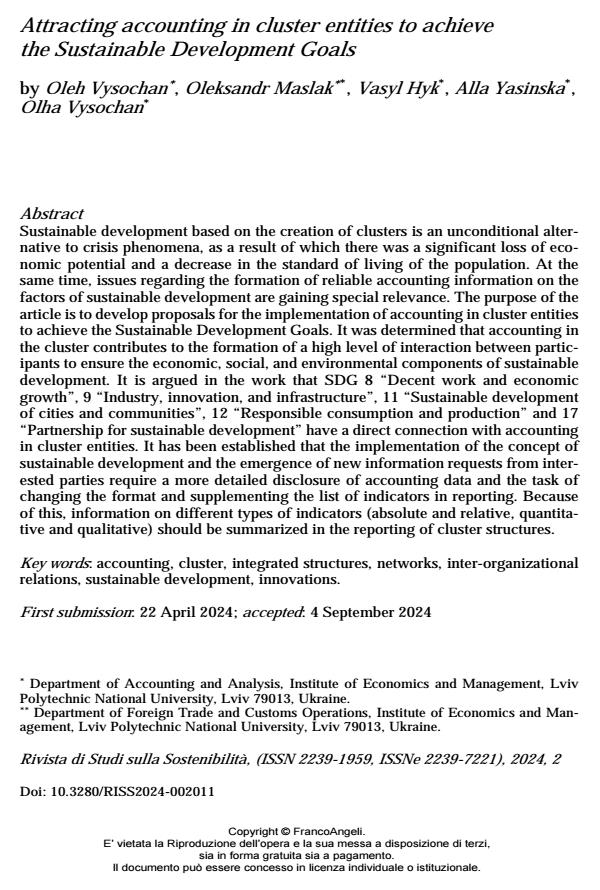Attracting accounting in cluster entities to achieve the Sustainable Development Goals
Titolo Rivista RIVISTA DI STUDI SULLA SOSTENIBILITA'
Autori/Curatori Oleh Vysochan, Oleksandr Maslak, Vasyl Hyk, Alla Yasinska, Olha Vysochan
Anno di pubblicazione 2024 Fascicolo 2024/2
Lingua Inglese Numero pagine 15 P. 181-195 Dimensione file 183 KB
DOI 10.3280/RISS2024-002011
Il DOI è il codice a barre della proprietà intellettuale: per saperne di più
clicca qui
Qui sotto puoi vedere in anteprima la prima pagina di questo articolo.
Se questo articolo ti interessa, lo puoi acquistare (e scaricare in formato pdf) seguendo le facili indicazioni per acquistare il download credit. Acquista Download Credits per scaricare questo Articolo in formato PDF

FrancoAngeli è membro della Publishers International Linking Association, Inc (PILA), associazione indipendente e non profit per facilitare (attraverso i servizi tecnologici implementati da CrossRef.org) l’accesso degli studiosi ai contenuti digitali nelle pubblicazioni professionali e scientifiche.
Sustainable development based on the creation of clusters is an unconditional al-ternative to crisis phenomena, as a result of which there was a significant loss of economic potential and a decrease in the standard of living of the population. At the same time, issues regarding the formation of reliable accounting information on the factors of sustainable development are gaining special relevance. The pur-pose of the article is to develop proposals for the implementation of accounting in cluster entities to achieve the Sustainable Development Goals. It was determined that accounting in the cluster contributes to the formation of a high level of inter-action between participants to ensure the economic, social, and environmental components of sustainable development. It is argued in the work that SDG 8 “De-cent work and economic growth”, 9 “Industry, innovation, and infrastructure”, 11 “Sustainable development of cities and communities”, 12 “Responsible consump-tion and production” and 17 “Partnership for sustainable development” have a direct connection with accounting in cluster entities. It has been established that the implementation of the concept of sustainable development and the emergence of new information requests from interested parties require a more detailed disclo-sure of accounting data and the task of changing the format and supplementing the list of indicators in reporting. Because of this, information on different types of indicators (absolute and relative, quantitative and qualitative) should be summa-rized in the reporting of cluster structures.
Parole chiave:accounting, cluster, integrated structures, networks, inter-organizational relations, sustainable development, innovations.
Oleh Vysochan, Oleksandr Maslak, Vasyl Hyk, Alla Yasinska, Olha Vysochan, Attracting accounting in cluster entities to achieve the Sustainable Development Goals in "RIVISTA DI STUDI SULLA SOSTENIBILITA'" 2/2024, pp 181-195, DOI: 10.3280/RISS2024-002011